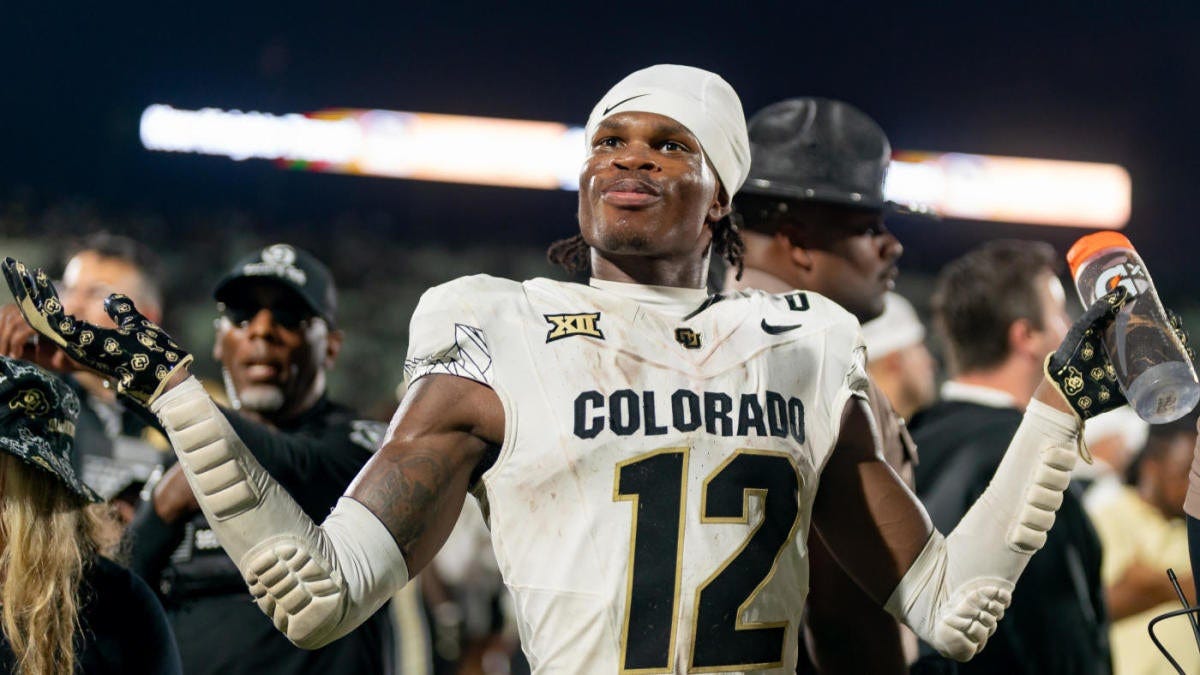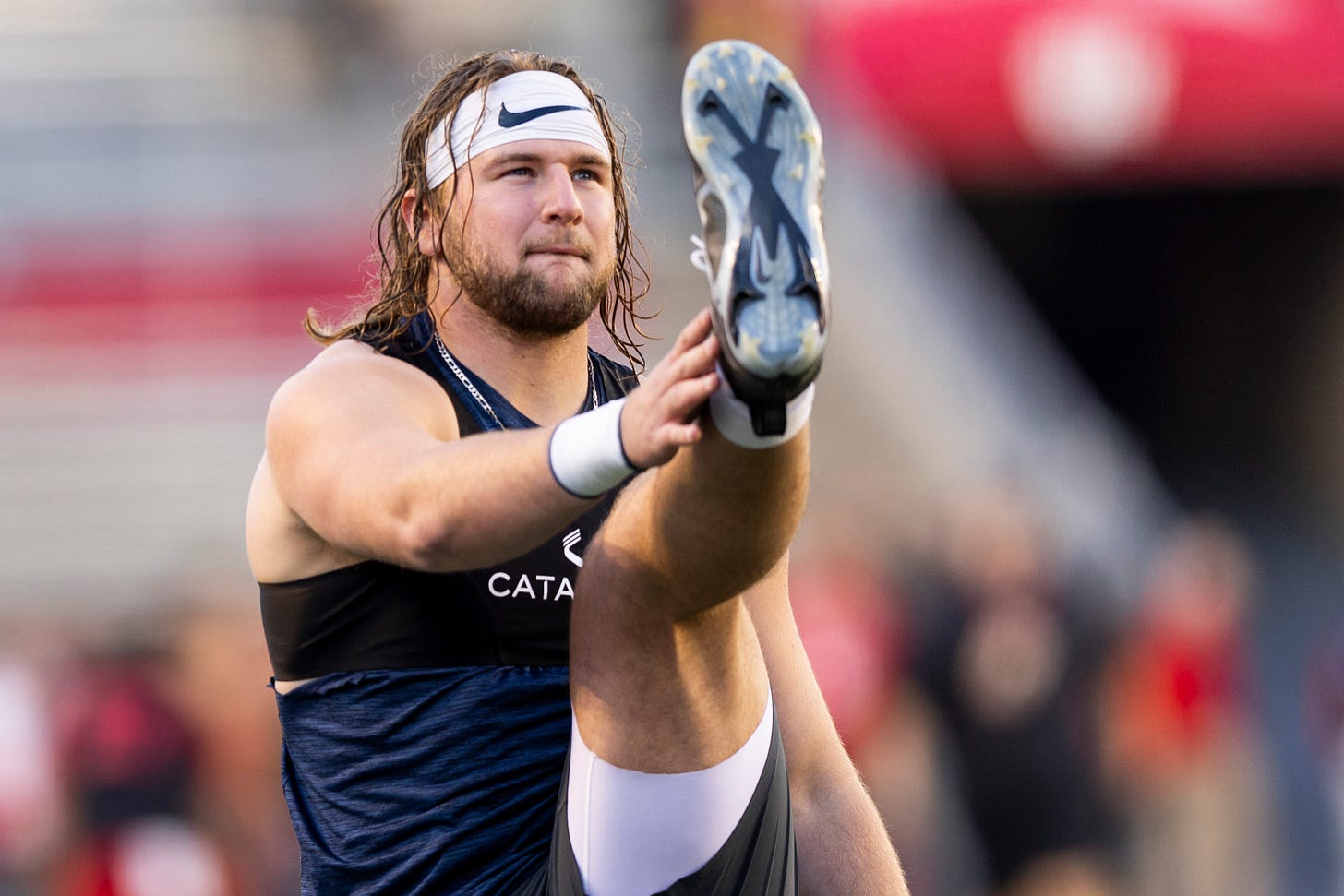The Five: The Whims of the Voters (1949)
The Heisman Trophy, virality, and flawed logic.
This is Throwbacks, a newsletter by me, Michael Weinreb, about sports, history, culture and politics, and everything in-between.
If you like what you read, please click the button below, join the mailing list for FREE and please share, on social media or through e-mail or however you feel comfortable sharing.
And if you’ve been reading for a while, please consider a paid subscription to help keep this thing going—you’ll also get full access to the archive of over 200 articles. (And right now, you’ll get 20 percent off either a monthly or annual subscription for the first year.)
I.
Seventy-five years ago, the best player in college football was Leon Hart, a 6-foot-5, 260-pound end at the University of Notre Dame. Hart is still the largest human being to ever win the Heisman Trophy, awarded to the best player in the country; he is also the last player at the end position—tight end or defensive end—ever to win the Heisman Trophy. Hart was big and fast and tough and he had great hands. He could run the football and catch the football on offense and he was a menace on defense, and if Leon Hart played football today, he would absolutely not win the Heisman Trophy.
II.
I think part of the problem with living through the current moment as a middle-aged human being is that the whole attention economy makes no sense to me anymore. Because I’m not tuned in to the rhythms of social media, I no longer understand how or why things become popular. It feels like things become viral for no substantive reason at all. Somebody on my social media feed recently recounted their child explaining Tik-Tok virality to them, and how style meant everything and substance meant literally nothing. This is how we make memes now; hell, this is how we elect presidents. And yet in a much less consequential way, for many, many years, this is also how the winner of the Heisman Trophy has been chosen.
I’ve written a good deal about the marketing and political aspects of the Heisman Trophy vote, because I think it often reflects our societal biases and our flawed perceptions. A few years back, I interviewed Stanford running back Christian McCaffrey for a story about why he likely wouldn’t win the Heisman because he played in the wrong time zone. McCaffrey ran for 1600 yards and finished ninth in the Heisman voting before becoming one of the best running backs in professional football. The next year, a Penn State running back, Saquon Barkley—one of the two most dynamic rushers I’ve seen this century (Reggie Bush is the other)—finished fourth in the Heisman voting before becoming one of the best running backs in professional football.
There is a peculiar dynamic to the way people vote for the Heisman. It is driven largely by groupthink—by, for instance, what game a cluster of voters might be watching on televison in a given week—and often by ill-informed regional factionalism. People apply their own logic to the vote, and that logic is driven by an irrational feeling that they can’t always explain. In the late 20th century, the award almost always went to a running back. Then, as the game evolved into a more pass-heavy product, some silent truce emerged and we all agreed that the Heisman should almost always go to a quarterback. Heisman voting has never been about making the most logical decision; it’s more a reflection of how our perceptions are being shaped at any given moment, like right now.
III.
So, in this era of inexplicable virality, allow me to present you with a picture of two extraordinary and contrasting football players.
One is a generational talent, a two-way player at wide receiver and defensive back who happens to be coached by the most flamboyant athlete of his generation. This is a football player who has been groomed to win the Heisman Trophy for his entire career, who literally runs pass routes on plays that are called “Heisman.”
And the other is a shaggy-haired dude who was not on any Heisman watchlists at the start of the season, who is mostly a pass-catching tight end but also takes turns at quarterback and running back, and who plays with a lumbering ferocity that feels like a throwback to the era of Leon Hart.
The first football player is Travis Hunter of the University of Colorado. The second football player is Tyler Warren of Penn State University. Hunter is currently the odds-on favorite to win the Heisman Trophy; Warren is unlikely to even be a finalist. And this bothers me, in part because I see things through my own regional and cultural biases, and in part because it makes me feel old.
IV.
This is not to say that Travis Hunter is undeserving of the Heisman Trophy. Honestly, if I had a vote, I would probably cast it for him at this point. He is an incredible football player who deserves the attention he’s getting, and the fact that he has not been overshadowed by the performance of any quarterbacks, including his own, speaks to his impact. But I do wonder if Hunter is also the ideal Heisman winner for this moment, when virality drives the culture, and when his coach, Deion Sanders, appears to be dragging the nation’s most stodgy profession—college football coach—into a new era where salesmanship matters as much as leadership. And I wonder if Tyler Warren’s attempt to drag us backward in time is just not made for the moment.
“I’m just not sure we’re collectively ready to award a Heisman in this era to a tight end,” wrote Darian Somers, proprietor of a website focused on Penn State sports. “It’s kind of hard to take a burly dude who isn’t the fastest or the most graceful seriously.”
V.
I think the easy thing to say here is that the disparity of attention between these two football players somehow reflects the decline of substance in the national discourse. And maybe there’s at least a little bit of truth to that. Maybe that’s just where the culture is. Maybe social media has warped our brains. Maybe Travis Hunter is where we are right now (and in this case, unlike many others, he’s actually a worthy and qualified reflection of where we are), and maybe Tyler Warren isn’t where we are right now. As Somers writes, Warren reflects a “workman-like, traditional tight-end attitude” that feels entirely removed from the current moment.
It’s frustrating to me how people can’t acknowledge that Tyler Warren is at least worthy of consideration for the Heisman, but voting is a strange and capricious thing. People make choices based on inscrutable factors, which is how a quarterback named Jason White won the Heisman Trophy and how a kicker was once named NFL MVP and how Forrest Gump won an Oscar for best picture in 1995. Sometimes voters make the wrong choice altogether, and sometimes it takes them years to realize just how wrong they were.
This newsletter is a perpetual work in progress. Thoughts? Ideas for future editions? Contact me via twitter or at michaeliweinreb at gmail, or leave a comment below. If you enjoyed this newsletter, please subscribe and/or share it with others.




Having seen what Tyler Warren did single-handedly to USC this season it is no stretch for him to get my Heisman vote. Hunter is a dandy runner up on my ballot.
This is excellent! Thank You! 🏈